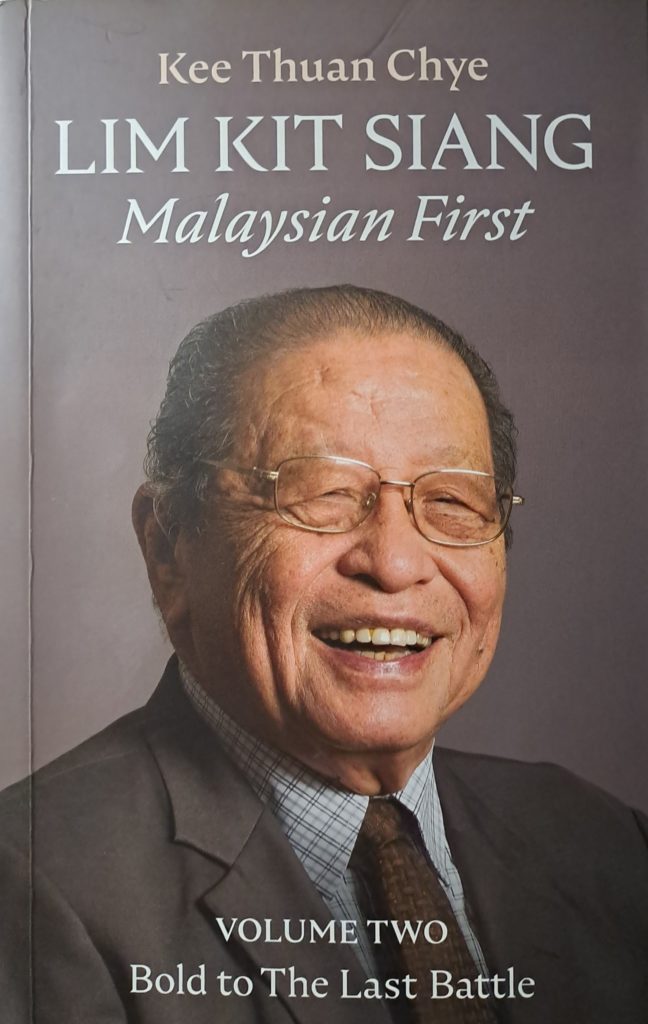A book review by Sebastian Lim

Title: Lim Kit Siang – Malaysian First (Volume Two): Bold to the Last Battle
Author: Kee Thuan Chye
Publisher: Strategic Information and Research Development Centre
ISBN: 9786297575131
In this continuing account of Lim Kit Siang’s life and 56-year political career, dramatist-journalist Kee Thuan Chye picks up from where Lim and Guan Eng were arrested under ISA at the end of Volume One, to offer a story full of intrigue, emotional moments, dramatic twists and turns and occasionally, some laughter and joy.
What comes through clearly is Lim’s resilience in fighting for his Malaysian Dream – his lifelong vision for a united, democratic and prosperous nation in which all citizens will have the opportunity to achieve success and find fulfilment.
We see in this story how Lim is able to set aside deep-seated political differences and forgive the political enemies who had unfairly caused pain and suffering on him and his son for the sake of realising that dream.
We also see the important role played by Lim’s devoted wife and children in giving him the support he needs as he fights the forces set on dividing the nation, stealing from the people and destroying the rule of law.
To achieve that dream, Lim has to forgo his personal feelings to look at the bigger picture to work with his enemies.
In the 1990 general election, Lim entered into an alliance with former finance minister Tengku Razaleigh Hamzah, whom Mahathir had out-manoeuvred from Umno. In 1998, when Mahathir ousted his ally-turned-foe Datuk Seri Anwar Ibrahim as prime minister-in-waiting, Lim fought for a political union with him and the Islamist party, Parti Islam Se-Malaysia (PAS), to unseat Umno.
And, in 2018, in a shocking twist to national politics, Lim approached Mahathir, who had left Umno complaining of endemic corruption, to form an alliance to expel this party from government. On these three pivotal occasions, when Umno elites feuded over the government’s much-abused race-based patronage system, Lim cooperated with ousted politicians to create coalitions to take on the dominant Umno.
As this book notes, Lim’s ties with former Umno leaders and with PAS set off internal disagreements with his DAP colleagues and the party’s support base.
Unfortunately for Lim, his coalition with Tengku Razaleigh failed to oust Umno while the Anwar-PAS-DAP trinity contributed to a shocking outcome. For the first time, Lim was without a seat in parliament, and that was during the 1999 reformasi election.
It was only when Lim teamed up with his long-standing adversary, Mahathir, that he achieved what he thought he would never accomplish in his lifetime – to kick Umno from the federal government, replace it with a coalition he had helped conceive, and begin the process to reform Malaysia’s form of governance. Unfortunately, the PH government only lasted 22 months.
But, as Kee also observes, the Lim-Mahathir pact was an odd relationship between two bitter foes, one that upset their allies and shocked the nation. Being pragmatic, both knew they had to deal with a bigger, serious problem – kleptocracy – committed by then prime minister, Datuk Seri Najib Razak, especially as the domestic and global backlash against his grand corruption grew.
As this book fittingly notes, Lim’s contributions to Malaysia are legendary. They included his vocal and persistence exposes on scandals such as BMF, Perwaja Steel, 1MDB, bailing out of Konsortium Perkapalan Berhad (majority owner was Mahathir’s son, Mirzan), MAS, Renong Group, Port Klang Free Zone, Lingam Tapes and many more.
There will be disagreements about his political pragmatism and his willingness to forge alliances with politicians and parties advocating race- and religion-based politics, which he had always opposed.
But what will not be questioned is Lim’s genuine desire to find a way, through dialogue, to create a Malaysia for all Malaysians.
With DAP’s success in the 2008 general election, the leaders face greater political repression and persecution. Stories of betrayals within the party continued unabated.
Eventually, Lim finds himself in the centre of some of these controversies although he keeps trying to steer the party on to a new direction. Like in wanting to rejuvenate the party with new and professional talent came to be perceived as a threat to some of the old guards.
The pre- and aftermath of the Sheraton Move was dealt with in great detail and how it affected and demoralised Lim and his party.
The second volume is also heavy going for readers, spanning over 540 pages.
Malaysians must acknowledge the political struggles, trials, tribulations and sacrifices of Lim Kit Siang and his dogged pursuit for his Malaysian Dream. As the two volumes of his biography show, he has proven throughout his long career that he not only truly cares for his country and its people, but is also a visionary ahead of his time.
For his sacrifices and contributions, Lim was conferred the Tan Sri title by Yang di-Pertuan Agong Al-Sultan Abdullah Riayatuddin Al-Mustafa Billah Shah on June 5, 2023, months after he retired from active politics at age 82.
Certainly these two volumes are recommended for students of Malaysian politics.
Sebastian Lim is an experienced journalist and editor who now runs his own book review blog — coolreadsseb.blogspot.com. The views expressed here are those of the writer and do not necessarily represent that of The Weekly-Echo.
WE